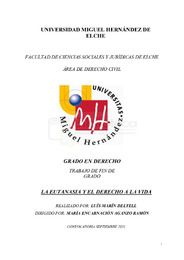Por favor, use este identificador para citar o enlazar este ítem:
https://hdl.handle.net/11000/26282La Eutanasia y el derecho a la vida
| Título : La Eutanasia y el derecho a la vida |
| Autor : Marín Deltell, Luis |
| Tutor: Aganzo Ramón, María Encarnación |
| Editor : Universidad Miguel Hernández de Elche |
| Departamento: Departamentos de la UMH::Ciencia Jurídica |
| Fecha de publicación: 2021-09 |
| URI : http://hdl.handle.net/11000/26282 |
| Resumen : El derecho a la vida y la eutanasia son dos conceptos que se muestran en controversia en este trabajo, por una parte, el derecho fundamental más importante de todos, ya que de éste parten los demás y por otro lado la solicitud de ayuda para morir, que vulnera el derecho a la vida pero que puede quedar autorizada en casos que se definen como legales según el interés de la sociedad. Por lo que se intenta mostrar con el con el siguiente trabajo, todo lo referente a la historia de la eutanasia, los derechos que la envuelven, como es el derecho a la vida, a una muerte digna, el de libertad, y de la dignidad tanto física como moral, siendo esto los principales. Conforme se va profundizando en la historia de la eutanasia a lo largo de los tiempos, se comprueba de lo que puede llegar a ser tener una vida digna sin una muerte digna, siendo la última un elemento fundamental de la primera, dado que es al final de la vida cuando más necesario es garantizar los derechos de la persona a no ver mermadas sus capacidades en exceso, así como a evitar el sufrimiento que supone la dependencia, y el dolor físico y moral. Con este trabajo se intenta trasladar los diferentes puntos de vista de profesionales, escritores y políticos sobre la práctica de la eutanasia, analizando las diferentes leyes y prohibiciones que existen en otros países, realizando una comparación entre las diferentes naciones, pero sobre todo estudiando en profundidad la legislación española, la cual fue modificada en el año 2020, mostrando la evolución del criterio de los partidos políticos españoles, los cuales, siempre, han defendido dar el mejor final a los enfermos que padezcan enfermedades incurables y padezcan gran sufrimiento y defender la voluntad de éstos en todo momento, utilizando los testamentos vitales esto es, la plasmación de la voluntad del paciente cuando tiene uso de la capacidad en relación con los cuidados médicos que se desea recibir o no en caso de padecer una enfermedad irreversible, tratamientos aplicables, la prolongación artificial de la vida, el destino de los órganos, u otras disposiciones previas al fallecimiento The right to life and euthanasia are two concepts that are shown in controversy in this work, on the one hand, the most important fundamental right of all, since the others are based on it, and on the other hand, the request for help to die, which violates the right to life but which can be authorised in cases that are defined as legal according to the interests of society. The following paper attempts to show the history of euthanasia, the rights involved, such as the right to life, the right to a dignified death, the right to freedom, and the right to physical and moral dignity, which are the main ones. As one delves deeper into the history of euthanasia throughout the ages, it becomes clear what a dignified life can be without a dignified death, the latter being a fundamental element of the former, given that it is at the end of life when it is most necessary to guarantee the rights of the person not to see their capacities excessively diminished, as well as to avoid the suffering that dependence and physical and moral pain entail. The aim of this work is to convey the different points of view of professionals, writers and politicians on the practice of euthanasia, analysing the different laws and prohibitions that exist in other countries, making a comparison between the different nations, but above all studying in depth the Spanish legislation, which was modified in the year 2020, showing the evolution of the criteria of the Spanish political parties, which have always defended giving the best end to euthanasia, have always defended giving the best end to patients suffering from incurable diseases and great suffering and defending their will at all times, using living wills, i.e., the expression of the patient's will when they have the use of their capacity in relation to the medical care they wish to receive or not in the case of suffering an irreversible disease, applicable treatments, artificial prolongation of life, the destination of organs, or other dispositions prior to death |
| Palabras clave/Materias: Eutanasia reforma ley muerte derecho a la vida consentimiento enfermedad Euthanasia reform law dead the right to life consens disease |
| Área de conocimiento : CDU: Ciencias sociales: Derecho |
| Tipo de documento : info:eu-repo/semantics/bachelorThesis |
| Derechos de acceso: info:eu-repo/semantics/openAccess Attribution-NonCommercial-NoDerivatives 4.0 Internacional |
| Aparece en las colecciones: TFG- Derecho |
 La licencia se describe como: Atribución-NonComercial-NoDerivada 4.0 Internacional.
La licencia se describe como: Atribución-NonComercial-NoDerivada 4.0 Internacional.
.png)
